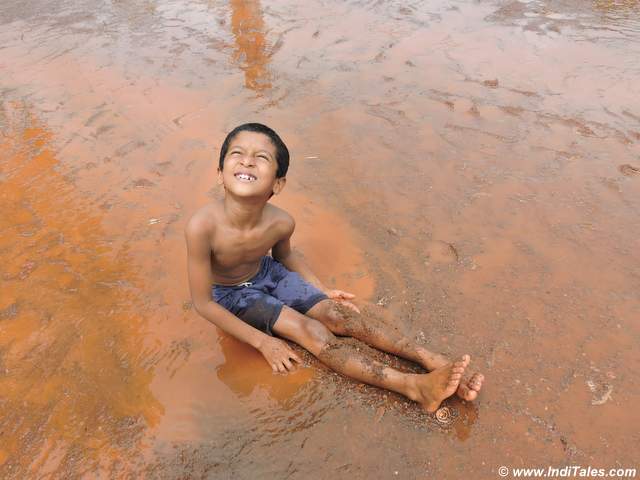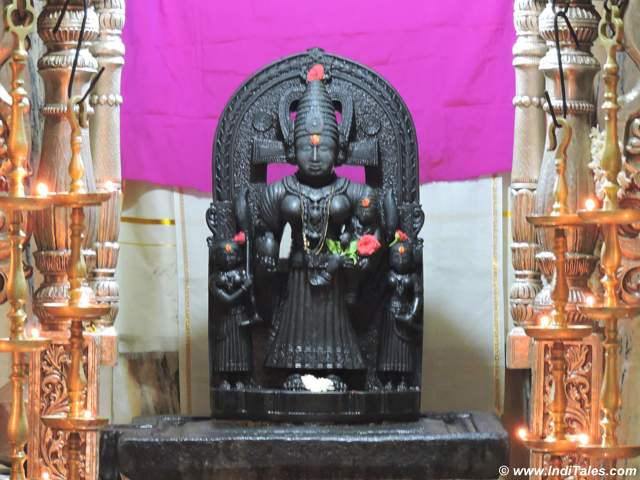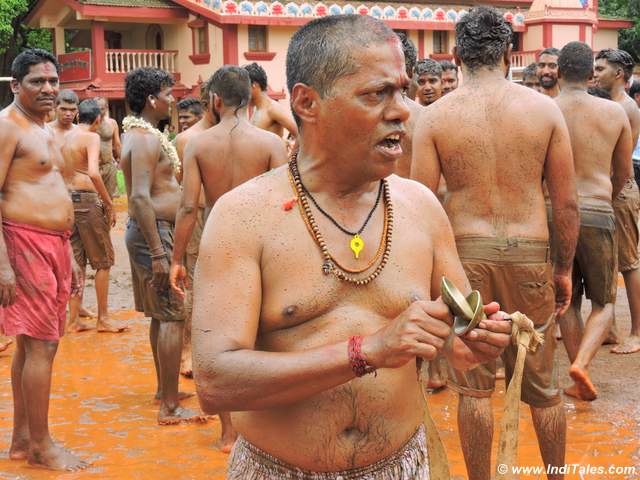Chikal Kalo is a local Goan festival – one of the many that you see only in Goa. It is celebrated on the 12th day of the month of Ashadh which roughly falls in the 2nd or 3rd week of July. Yes, right in the middle of the legendary monsoons of Goa. For 2 years, I read about this Monsoon Mud Festival in Goa, in the newspapers, the day after it happened.

This year I was determined to attend this festival and on the given day I was standing in front of Devaki Krishna temple.
Chikal Kalo & Devaki Krishna Temple

I had earlier written about the Devaki Krishna temple in my post on Saraswat temples in Goa. You can read about the history and legends of the Devaki Krishna temple in that post. In this post, I will talk only about the rituals associated with the Chikal Kalo festival and the temple.
On the 11th day i.e. Ekadashi of the Ashaad month of the Hindu calendar, a 24-hour Akhand Satsang is started at Devaki Krishna temple. This starts around 11 AM and goes on non-stop till the next day at 11 AM. An oil lamp is kept burning through these 24 hours in front of the idol of Devaki holding baby Krishna in her arms. I reached around 10:00 AM and spent an hour listening to the bhajans being sung by local residents of Marcela. See the video of one of the bhajans here.
The temple was originally located at Chorao island. The Monsoon Mud Festival moved to Marcela along with the temple, during the Portuguese rule. How old is this festival, no one knows, and frankly, no one cares.
Mud Festival Chikal Kalo

The festival celebrates the naughty nature of Bal Krishna or Baby Krishna. Those of us who follow Hindu scriptures and stories know that Krishna is known for his childhood antics with his mother and other people of Braj Bhumi. At Marcel, this very nature of Krishna is celebrated. On this day, every male – from a toddler to a senior citizen becomes a little Krishna. How they take the Swaroop of a Bal Krishna is something you have to see to believe.

In the ground opposite the temple, with a large Peepul tree overlooking the activities, all the villagers gather to celebrate the festival. The soil of the ground is muddy with incessant rains that grace this coastal state of Goa. The boys will play in this mud. The games they play are the same games that Krishna played with his friends in Braj Bhumi.
To me, this was the second re-creation of Braj Bhumi that I witnessed after Nathdwara.
Rituals of the Mud Festival

Bare-bodied men wearing just the shorts start appearing in the street outside the Devaki Krishna temple around 10:30 AM. Small children start playing in the mud much to the amusement of photographers gathered to click the festival. The festival starts with these men applying oil to their bodies. I saw some elderly men coming to the ground with oil bottles going to kids on the muddy ground. Most men – young and old lined up at Mr. Laxmikant Govenkar’s grocery store to get oil on their bodies.
Oil well the participants of the Mud Festival

I spoke to Mr. Govenkar and asked about him giving the oil to the participants of Chikal Kalo. He believes it is a blessing that he gives oil to these Krishnas. Oil protects them against any possible infection from the mud. He has cans of oil lined up for the day, though he had no idea how many people will actually land up. He was willing to give oil to whoever landed up to get oil. His family has been practicing it for generations. When and why did they start doing this – no one knows, and more importantly, no one cares.

Once oiled all the men line up to the small temple dedicated to Daad Sakhal bang opposite the Devaki Krishna temple. The drums are played and the priest applies tilak on the foreheads of these men, who then start singing ‘Hari Vithal, Jai Vithal’. The air reverberates with the rhythm of their chanting. They sit together for a photo op as all the photographers point their cameras toward them. Singing the chant they move towards the temple.
Pray at Devaki Krishna Temple

At the temples, these oil-soaked bodies do a circumambulation, or the parikrama of the temple before entering the temple. Inside the temple, the decibel levels shoot up as the same sound is now restricted within the walls of the temple. The men go around the lamp like they are possessed. The sheer energy of so many of them dancing and singing to the tune of the beating drum has to be felt. I stood in a corner, trying to shoot them. The energy inside the temple walls was exhilarating.
After a while, everyone took a bit of oil from the lamp and proceeded to the grounds on the other side of the road. Other devotees also apply a bit of oil on their foreheads. It kind of declares the festival open.
Food served

The scene now moves to the Peepul tree opposite the temple. Many villagers with tempting food items stand on the pedestal. They throw the food toward the crowd of oiled men who try their best to catch it. The one who grabs it – gets it. This is the first game.

After this, many elderly people are seen distributing food, especially sweets like Laddus, Jalebis, Biscuits, Pooran Polis, or simple Puris. They go around distributing and even insisting that everyone has something before the real action begins on the muddy ground. This was amazing. There was no stall, no food was being sold, and no commercial activity. Everyone was fed affectionately by the village elders. I could feel their love when I took a laddu from one hand and a jalebi from another.
Muddy Games at Chikal Kalo

Music from cymbals and drums started reaching my ears and I saw people doing the warm-up exercises to their rhythm. With soft movements they stretched their limbs, getting ready for the sports to follow. Suddenly we saw some commotion in the back, only to realize that a few young men were lifting one of them to a puddle, where they would not only throw him but also splash the mud on him. The mud, of course, was impartial and spared no one including yours truly.
Since I had mud on me in the first 10 minutes of the festival, I did not care for anything but my camera lens for the rest of the festival.
Other games played


- Mendrani – the sheep and wolf game.
- Blind Man game – where a blindfolded man has to catch the man playing cymbals. The rest of the crowd leads him, misleads him, and cheers him. It is such fun to watch this game.
- Chakra – this is where young men put together their feet to make a formation of Chakra – the wheel. Remember, the wheel is one of the symbols associated with Krishna, the avatar of Vishnu.
- Dharchyani or Dog & Bone – I am sure it brought a smile to your face and reminded you of your childhood days. Now just add a lot of mud to the scene to get a feel of the mud festival.
- Tug of War – Imagine playing it when you are already soaked in mud
- Kabbadi – this is more like wet kabaddi
- Tunnel – this is interesting as people hold hands and make a tunnel and some people have to run through this tunnel without being caught. In North India, we used to call this Poshampa – no idea what that means. At this mud festival, though the tunnel is much longer owing to the fact that the whole village is playing.
- Frog game – Some men bend down in the form of frogs and others jump over them. It is a test of those who are bent, how long can they remain bent? It is so much fun to see mud-laden bodies jumping over each other.
Duel of words
Now, this is my favorite of all the games at Chikal Kalo. The whole crowd divides itself into two groups and they sit opposite each other. This is a fake marriage party with one side representing the bride and another side the groom. They make sarcastic remarks at each other with a loud noise. After a fair war of words, they agree to go ahead with a mock wedding. This is the penultimate game of the monsoon mud festival – a literal mud-slinging.
Dahi Handi

Dahi Handi is a game we associate with Janmashtami or Krishna’s birthday. In Goa, it is the climax of the mud festival. All the muddied men finally aim for a Handi tied to the peepul tree – the same tree that flagged off the event. Boys make a pyramid, to claim the Handi. Once broken, the curd inside the Handi splashed over everyone beneath it. More curd is thrown on the boys. Just imagine – Oil, mud, and then curd.

Seems like a free spa treatment.
After the games, all the participants go to Dhobi Talao for a bath. They are then fed by some families.
The culture of Chikal Kalo

I was there at the festival from the beginning until the end. While all the men messed around in the mud, all the women stood around and watched. Children played in their own groups. There was so much ‘Masti’ but not an iota of misbehavior. With women like me jumping around to click, not for a minute, we felt we are not safe. Everyone enjoyed in their own way – some in the mud and others watching them. There was such an endearing sense of community and an aura of fun-filled happiness.
Video of Chikal Kalo Festival, Goa
Watch this video of the monsoon mud festival. We managed to capture during the event in 2016.
I wondered if small is beautiful is at play or if this is how our cultures are till they are spoilt by brutal commercialization. In fact, I heard someone say sponsors and I could imagine brand banners all around taking away the beauty of the festival. Let me say, I feel blessed that I could enjoy this festival before it got bitten by commercialized.
If you happen to be in the state around the time of this monsoon mud festival, you must watch it. It is a unique Goa experience – quite unlike what you expect in this touristy state.
Recommend you to read the following travel blog posts on Goa.















Great captures!
Thank you Rashmi. It is a unique festival of Goa, something that I have never seen elsewhere.
Never heard of this festival before this. I read it first on your blog. Great report of local tradition.
Even I did not know this. This is one of the many local Goan festivals I am discovering.
Never heard about it before . Really an interesting event !!
Yes Yogi, it is quite a unique festival. I am not aware anything similar anywhere else in the India.
nice information
Thank you Shibsankar Ji
What fun Anuradha. Loved the video. Hoping to see this for myself next year.
Yes Ami, you must come next year. Just ping me in July, will let you know the exact date for the festival in 2017. I have never seen a more enjoyable festival anywhere.
thank you Anuradha for highliting this unique festival
although iam goan by birth was not aware of such festival
your phtography is too good.so does yourwrite up
Thank you Prashant Ji. The very purpose of IndiTales is to put light on lesser known cultural aspects of India and world. Glad to know that you discovered a new festival from Goa.
wonderful video.i am thoroughly enjoying it. Such joy with abandonment ! i would like to be one of those little boys next time around. Thank you for sharig such a joyful festival.
[…] do recommend the Mud Festival of Devaki Krishna Temple – it is the most fun festival that we have ever seen […]
What a fantastic glimpse into the Chikal Kalo festival! Your vivid descriptions of the celebrations and the vibrant atmosphere truly transport me to Goa. I never knew about this unique tradition and how it brings the community together during the monsoon season. I can’t wait to experience it for myself someday! Thank you for sharing such a colorful post!
What a vibrant celebration! I love how you’ve captured the essence of the Chikal Kalo festival in Goa. The blend of mud activities, local culture, and monsoon ambiance sounds exhilarating. I can’t wait to experience this unique festivity firsthand! Thank you for sharing such detailed insights.
What a vibrant and delightful post! The Chikal Kalo festival sounds like such a unique way to celebrate the monsoon season in Goa. I love how you captured the essence of the event and the traditions surrounding it. Can’t wait to experience this wonderful festival myself!
What a wonderful depiction of the Chikal Kalo festival! Your vivid descriptions made me feel as if I were right there experiencing the vibrant colors and joyous celebrations. I love how you captured the essence of Goa during the monsoon. Can’t wait to plan a visit during the next festival!
What a vibrant and delightful read! The Chikal Kalo mud festival in Goa sounds like an incredible experience, especially during monsoon. I loved how you captured the essence of the festival and its connection to the local culture. I can’t wait to plan a visit and immerse myself in this unique celebration!
What a vibrant celebration! The Chikal Kalo festival sounds like an incredible way to embrace the monsoon season in Goa. I love how you highlighted the traditions and the community spirit involved. Can’t wait to experience the mud fun and local flavors firsthand!
What a vibrant and colorful depiction of the Chikal Kalo festival! I love how you captured the spirit of the monsoon and the joy of the mud festivities in Goa. It’s fascinating to learn about the cultural significance and community bonding that takes place during this time. Can’t wait to experience it firsthand!
What a vibrant and colorful post! I loved learning about the Chikal Kalo festival and how it captures the essence of Goan culture during the monsoon. The mud festivities sound like a unique and fun experience. Can’t wait to visit Goa during this time!